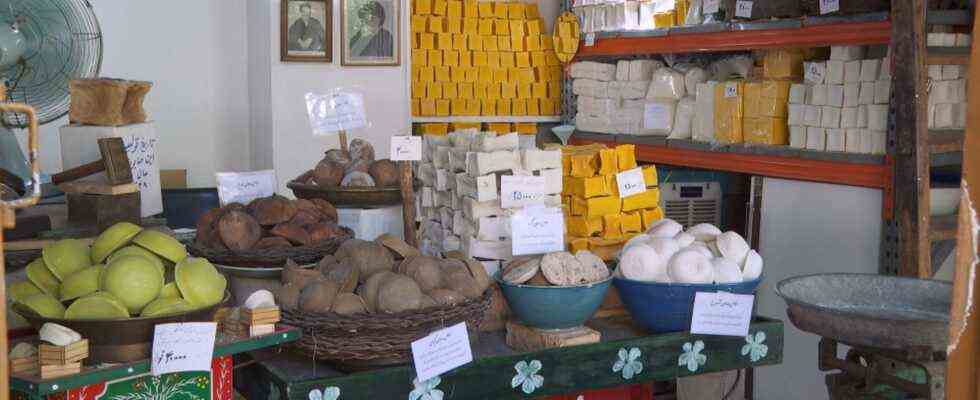report
Status: 10.10.2021 09:36 a.m.
A small shop in Tehran with soaps from its own production is successfully fighting the economic crisis in Iran. Tradition is in the foreground here, even if the internet opens up new possibilities.
Anyone looking for soap in Tehran will find what they are looking for in the Molavi district in the south of the city: In Mohammad Salehi’s small shop, the display is piled up to the ceiling and shines in bright colors.
Loyal to regular customers for many years
Particularly noticeable is the yellow soap, cut into rectangles the size of a piece of butter. “It is made with turmeric and is simply wonderful for the face,” enthuses one customer, for whom Mohammad Salehi is currently packing a copy. “It’s also good for pimples. My daughter only uses those.”
Above all, they are regular customers, some of whom have been shopping in Salehi’s shop for decades and rely on his tried and tested recipes. The 70-year-old is proud of it. “My father always said to me: produce good goods, then you don’t need advertising. Customers will tell their friends how good your soaps are, and word will get around. I have stuck to that to this day.”
Recipes that have been tried and tested for decades
The father was already working as a soap maker in the 1930s. Mohammad Salehi learned the craft from him as a teenager. He sticks to its traditional recipes to this day.
This makes him one of the last of his guild in Tehran, because the job is arduous and you don’t get rich as a soap maker. But at the moment the soaps are primarily providing a stable income, something that is not a matter of course in Iran. Because high inflation, a currency that has been weak for years and high unemployment are causing increasing impoverishment in Iranian society. The corona pandemic has further intensified this.
Mohammad Salehi’s small soap shop was one of the few that had only a minor impact. Of course he also senses that people hardly have any money left. But you tend to spend more on soap during a global pandemic. Especially since it is very little in the end: His bars of soap are cheaper than conventional liquid soap from the supermarket.
The soaps sold in the store are cheaper than liquid soap from the supermarket.
Image: Katharina Willinger, ARD Studio Istanbul
Soap with coffee, herbs or olive oil
Over the decades Salehi has developed a number of new products, such as a soap with coffee. A customer had commissioned it especially for himself, but then it turned out that the unusually fragrant soap is also well received by other customers. Since then, Salehi has been producing them regularly.
But classic herbal soaps or those with olive oil are particularly popular. “It is particularly good against dry soles of the feet and much more productive than the soaps from the supermarket,” says a customer with a black and white patterned headscarf. They are actually more sustainable: Because the soaps do not need packaging, customers get them packed in pieces, often by the kilo, in a thin plastic bag, like when buying vegetables.
Workshop on the edge of the desert
Production takes place in the company’s own workshop, around 50 kilometers south of Tehran. Mohammad Salehi drives to the remote industrial area several days a week and, despite his advanced age, still lends a hand. “It’s very hot here in summer and terribly cold in winter because it’s on the edge of the desert. It’s definitely not good for my health, but what should I do?” He asks with a shrug. A workshop closer to the city would be too expensive.
Mohammad Salehi runs into the great hall. There the soapy water bubbles away in large copper kettles. The master adds oil from large containers and stirs the brew with a metal scoop. Next door, one of his two employees is filling the finished mixture into small red plastic bowls. As soon as the soap is hard, the mass is removed, placed in the sun to dry and then packed in large boxes for transport.
Mohammad Salehi and his son Farhad still produce most of the soaps according to recipes that are decades old.
Image: Katharina Willinger, ARD Studio Istanbul
Son continues the craft and business
If you ask Salehi whether he is satisfied, he nods. He is a humble person. He is happy that his craft is not going to die out for the time being. Because his son Farhad works in the company and will probably take it over. Although he cannot yet make all the soaps himself, some things are still a matter for the boss. But he’s already working on boosting sales. “Since the pandemic in particular, many people have been shopping mostly online,” explains Farhad. “Since I went online last year, it has had a positive effect on our sales and a lot of young people have become aware of our traditional soaps.”
The sales and advertising platform in Iran is Instagram, which is of great economic importance in the Islamic Republic. Around 30 million people in the country are said to use it regularly. Virtually everything is sold through it: everything from groceries to handbags to cosmetics is included. And recently also the soap of the Salehi family.
Despite the modern sales market, customers like it traditionally, says Farhad. “We changed the shapes and scents of our soaps for a while, but buyers weren’t happy with it and wanted the old, traditional versions back. So we have to focus on the good quality that we had 50 years ago.”

